Predict the modes of occurrence of the following three types of metals:
(i) Highly reactive (e.g., Na)
(ii) Moderately reactive (e.g., Fe)
(iii) Noble metal (e.g., Au)
To predict the modes of occurrence of the three types of metals, we can categorize them based on their reactivity:
Step 1: Highly Reactive Metals (e.g., Sodium - Na)
- Occurrence: Highly reactive metals like sodium do not occur in their elemental form in nature due to their high reactivity. Instead, they are found in combined forms, often as salts or other compounds.
- Example: Sodium is commonly found in seawater as sodium chloride (NaCl).
Step 2: Moderately Reactive Metals (e.g., Iron - Fe)
- Occurrence: Moderately reactive metals such as iron also do not exist in their pure elemental form in nature. They are typically found in combined forms, often as oxides or sulfides.
- Example: Iron can be found in nature as iron(III) oxide (Fe2O3) or in various iron ores.
Step 3: Noble Metals (e.g., Gold - Au)
- Occurrence: Noble metals like gold are much less reactive and can be found in their elemental or native form. They do not readily combine with other elements.
- Example: Gold is often found in its pure, metallic form in nature, as nuggets or grains.
Summary of Modes of Occurrence:
- Highly Reactive Metal (Na): Found in combined form (e.g., NaCl).
- Moderately Reactive Metal (Fe): Found in combined form (e.g., Fe2O3).
- Noble Metal (Au): Found in native or elemental form (e.g., Au).
---
- Occurrence: Highly reactive metals like sodium do not occur in their elemental form in nature due to their high reactivity. Instead, they are found in combined forms, often as salts or other compounds.
- Example: Sodium is commonly found in seawater as sodium chloride (NaCl).
- Occurrence: Moderately reactive metals such as iron also do not exist in their pure elemental form in nature. They are typically found in combined forms, often as oxides or sulfides.
- Example: Iron can be found in nature as iron(III) oxide (Fe2O3) or in various iron ores.
- Occurrence: Noble metals like gold are much less reactive and can be found in their elemental or native form. They do not readily combine with other elements.
- Example: Gold is often found in its pure, metallic form in nature, as nuggets or grains.
- Highly Reactive Metal (Na): Found in combined form (e.g., NaCl).
- Moderately Reactive Metal (Fe): Found in combined form (e.g., Fe2O3).
- Noble Metal (Au): Found in native or elemental form (e.g., Au).
Topper's Solved these Questions
- BOOK - ICSECHAPTER - GENERAL PRINCIPLES AND PROCESSES OF ISOLATION OF ELEMENTS EXERCISE - EXERCISE (PART-II ( DESCRIPTIVE QUESTIONS )) (LONG ANSWER QUESTIONS)53videos
GENERAL PRINCIPLES AND PROCESSES OF ISOLATION OF ELEMENTS
- BOOK - ICSECHAPTER - GENERAL PRINCIPLES AND PROCESSES OF ISOLATION OF ELEMENTS EXERCISE - ISC EXAMINATION QUESTIONS ( PART - I (OBJECTIVE QUESTIONS)) (Complete the following statements by selecting the correct alternative from the choices given : )9videos
GENERAL PRINCIPLES AND PROCESSES OF ISOLATION OF ELEMENTS
- BOOK - ICSECHAPTER - GENERAL PRINCIPLES AND PROCESSES OF ISOLATION OF ELEMENTS EXERCISE - EXERCISE (PART-II ( DESCRIPTIVE QUESTIONS )) (VERY SHORT ANSWER QUESTIONS)288videos
GENERAL PRINCIPLES AND PROCESSES OF ISOLATION OF ELEMENTS
- BOOK - ICSECHAPTER - ELECTROCHEMISTRYEXERCISE - ISC EXAMINATION QUESTIONS (PART-II Numerical Problems)19videos
ELECTROCHEMISTRY
- BOOK - ICSECHAPTER - HALOALKANES AND HALOARENES EXERCISE - SOURCE9videos
HALOALKANES AND HALOARENES
Similar Questions
Predict the modes of occurrence of the following three types of metals :
(a) Highly reactive (e.g Na)
(b) Moderately reactive (e.g Fe)
( c) Noble metal (e.g Au).View SolutionWhich one of the following will have the largest number of atoms?
(i) 1 g Au (s)
(ii) 1 g Na (s)
(iii) 1 g Li (s)
(iv) 1 g of Cl2(g)View Solution
Knowledge Check
- Question 1 - Select One
Fragmentation, leaching and catabolism are some of the important steps of decomposition. Study the following statements I , ii and iii regarding these and select the correct option.
(i) Detritivores (e.g., earthworm) breakdown detritus into smaller particles.
(ii) Water soluble inorganic nutrients go down into soil horizon and get precipitated as unavailable salts.
(iii) Decomposers (e.g., bacteria and fungi) secrete digestive enzymes and degrade detritus into simpler inorganic substances.ALeachingFragmentationCatabolism(i)(ii)(iii)BLeachingFragmentationCatabolism(iii)(ii)(i)CLeachingFragmentationCatabolism(ii)(i)(iii)DLeachingFragmentationCatabolism(ii)(iii)(i)
The main group elements i.e. representative elements complete their electron configuration using s and p electrons in the periodic table. These elements range from the most metallic to the most non-metallic with intermediate properties, the semi-metals, in between .The elements which occur at the two extremes of the periodic table are highly reactive and therefore, these highly reactive elements do not occur in free state : they usually occur in the combined forms.
Beryllium and aluminium exhibit many properties which are similar, but, the two elements differ in :View SolutionReactivity of HCHO with the following G.R in the decreasing order is :
(i) PhMgBr
(ii) PhCH2MgBr
(iii)
(iv) .View Solution
.View SolutionPredict the order of reactivity of following compounds in dehydrohalogenation.
a. I. II.
II. 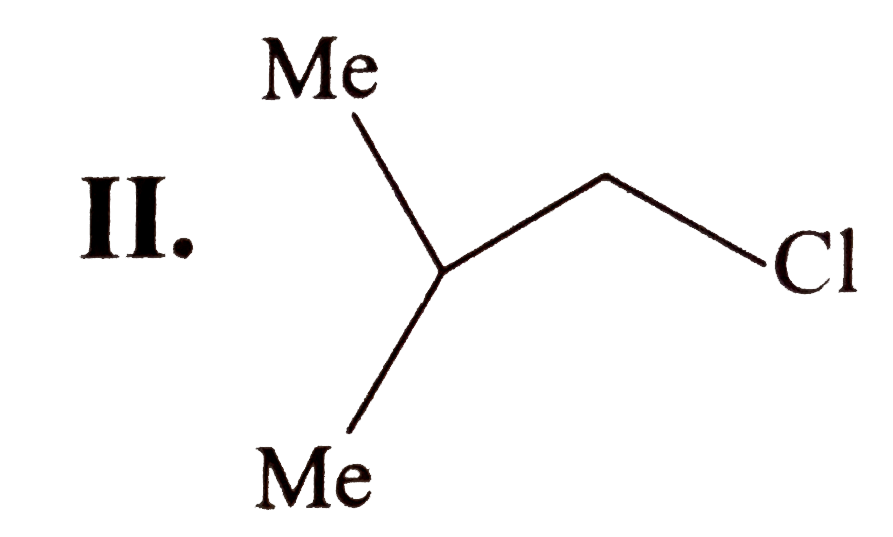
III.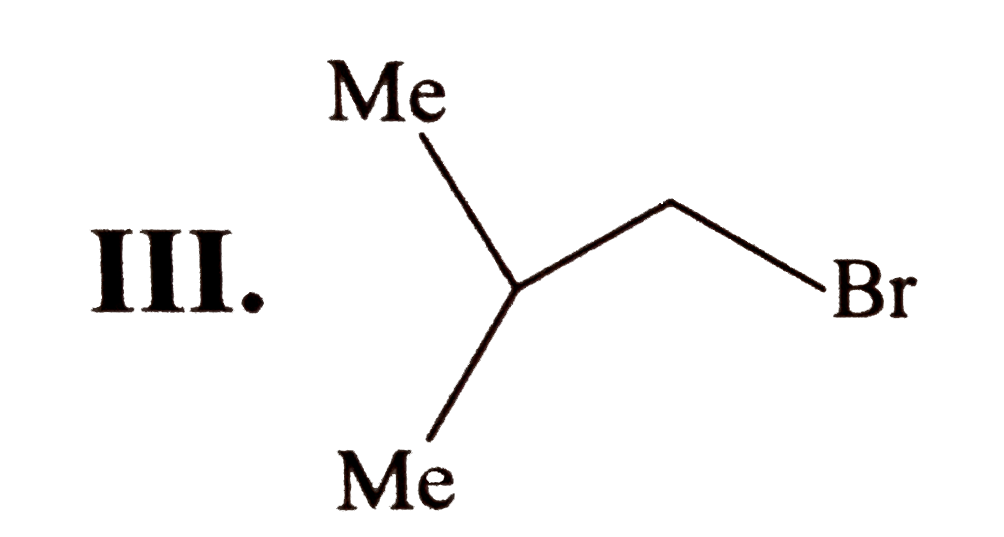 IV.
IV. 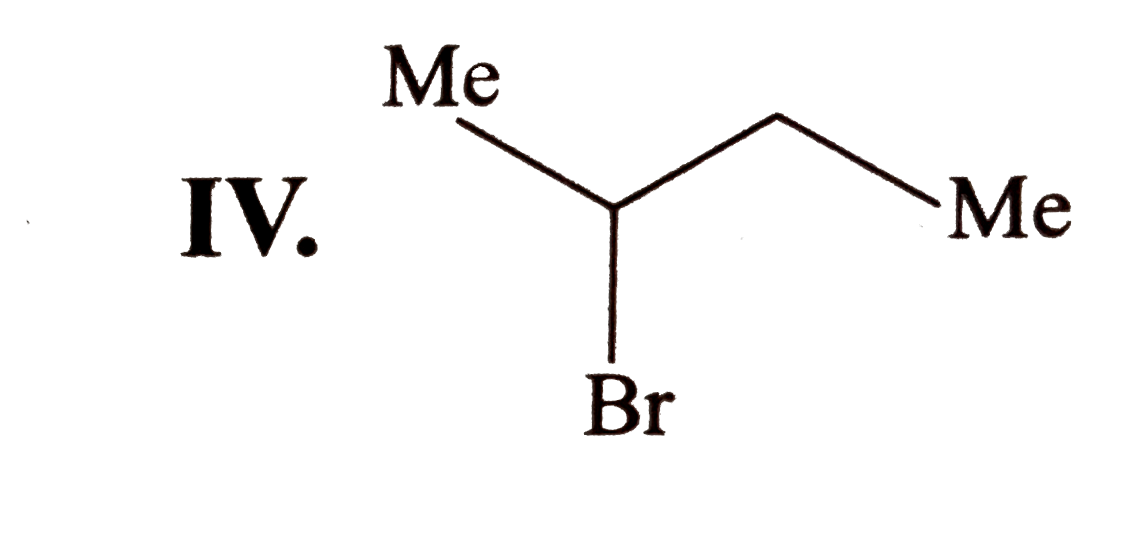
V.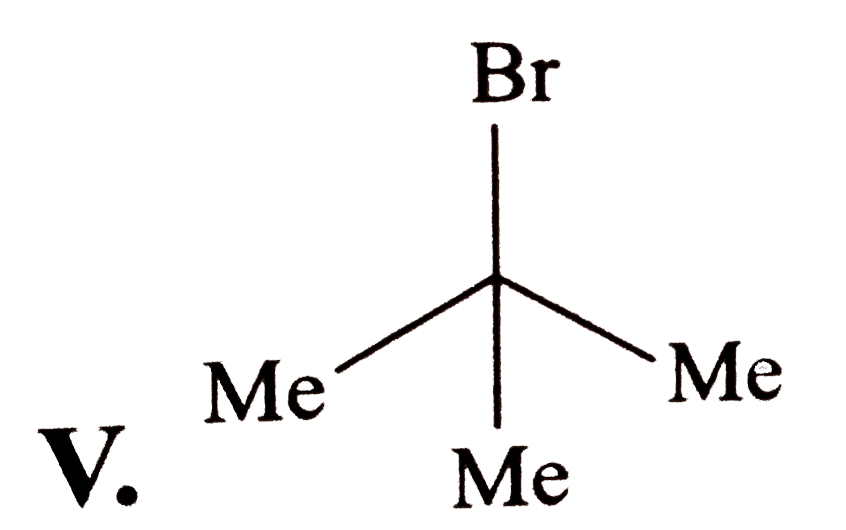
b. I. II.
II. 
III.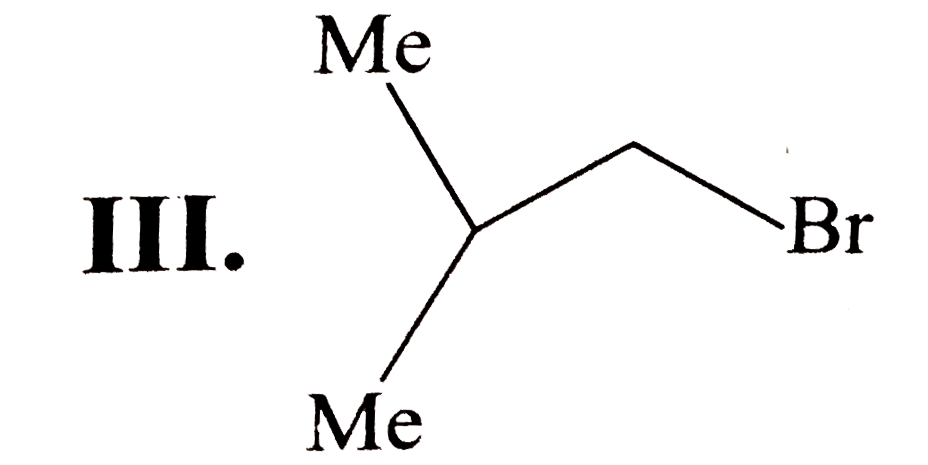 IV.
IV. 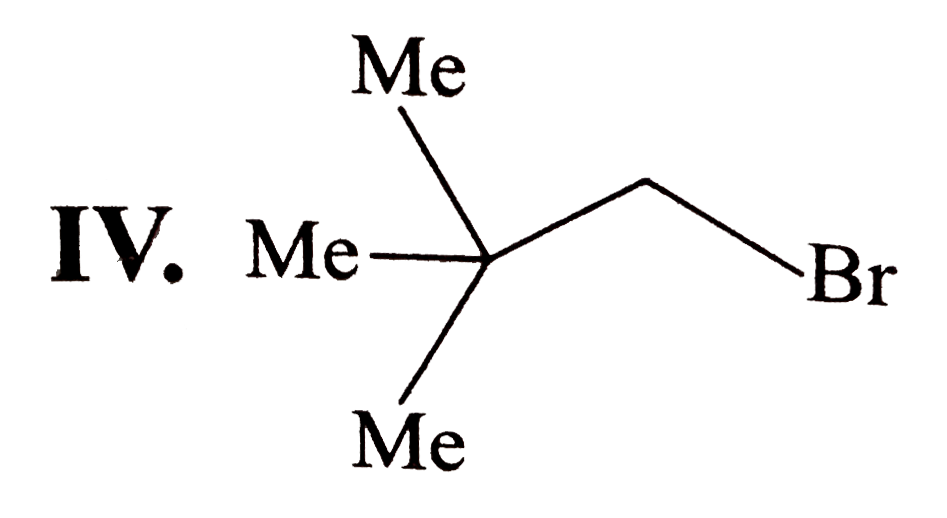 View Solution
View SolutionWhich of the following compounds would undergo Diels-Alder reaction with dienophile (e.g., Maleic anhydride) ?
View SolutionReactivity of
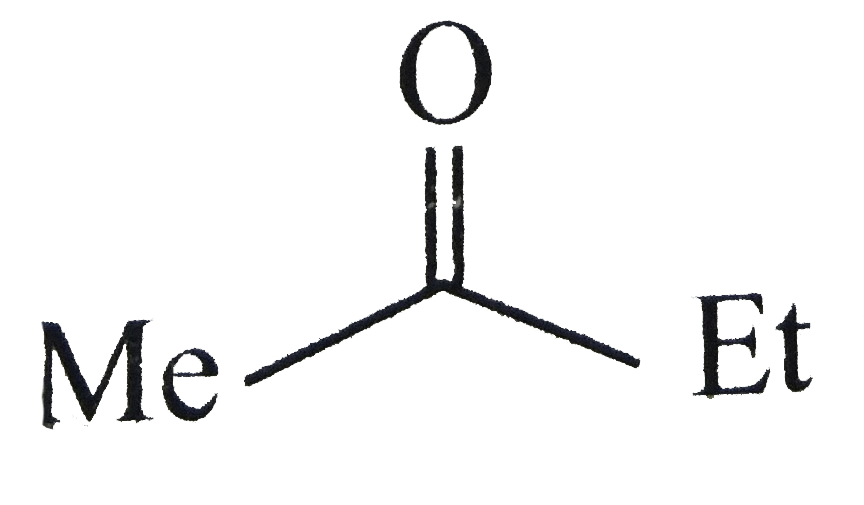 with the following G.R in the decreasing order is :
with the following G.R in the decreasing order is :
(i) MeMgBr
(ii) EtMgBr
(iii) Me2CH−MgBr
(iv) Me3C−MgBr.View SolutionIn the following reactions sequence, the correct structures of E,F and G are
 View Solution
View SolutionIn the following reaction sequence, products (A) to (G) are formed.
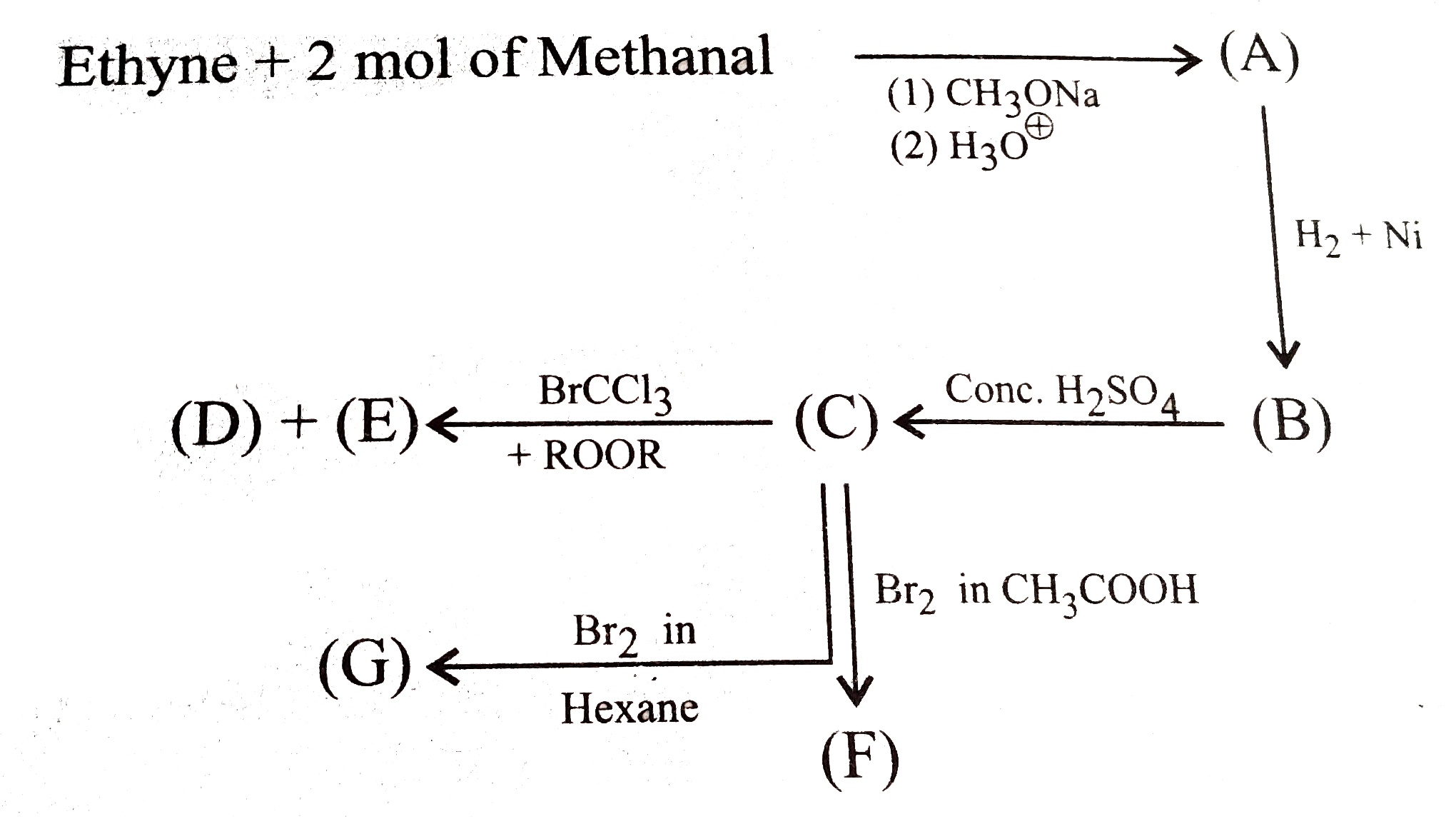
Product (D) and (E) is:View Solution
